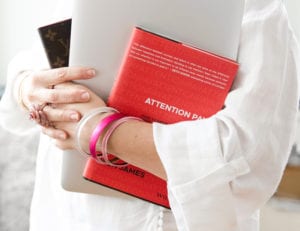Have you ever attended a panel and the moderator liked the sound of their own voice and talked too much? Ever sat through a panel discussion where someone hogged the stage and you didn’t hear from everyone?
Ever watched as the audience asked selfish questions, and time was wasted (yes, there are such things as selfish questions).
A great moderator fixes that!
The objective of a great moderator is to educate, entertain, and interact with the audience.
A great panel is like a valuable white paper, full of content and thought-provoking questions.
As the moderator, your client is the audience.
Here are strategies to apply before, during, and after the panel to make it more successful.
Before the panel
- Create bullet points for discussion and share them with the panel.
- Organize a group conference call for panelists to connect.
- Get photos and short biographies of panelists.
- Provide three questions to the panelists in advance to do some preparation, but not overly prepared.
- Keep all questions contextual for flexibility in responses.
- Prepare case studies and examples you can add as the moderator to complement the panelist input.
- Manage logistics, i.e., water for everyone, individual microphones, seating, and advise panelist to silence their cell (and preferably DON’T bring it on stage).
- Determine the social media strategy, i.e. What hashtag are you using? Who will manage questions asked by audience members?
- Determine the seating order and have a strong panelist begin.
During the panel
- Make the first question easy and the ice breaker.
- When asking a question, direct your attention to the panelist and then look out into the audience (that will encourage the panelist to look at the audience when they respond).
- Advise the audience of the guidelines and social media information.
Managing the panel
- Keep questions contextual,
- As them to focus responses to benefit the audience.
- Request they avoid pitching their products and services.
- Provide ‘bad’ examples and case studies so the audience can learn what to avoid (don’t just share good news case studies).
- Allow the panel to talk to each other (and with each other a little) but not to be rude.
- Allow debate, not stage hogging.
Managing the audience
- Always repeat the question for the benefit of the audience and the panelists.
- Ask the audience to state their name before they ask their question.
- Ask the audience to ask specific questions (and not make statements or share opinions) so the whole room benefits from the answer.
- Use microphones for questions (either located in the center aisle or have runners with hand-held microphones).
After the panel
- Share the panelist’s contact information with the audience.
- Encourage the audience to meet the panelists one-on-one.
- Send thank you note to the panelists.
Are you a panelist?
Your responsibility is to stand in service of the audience. This is your opportunity to provide insights to them that only you can give.
- Speak in sound bites. Share short messages they can process and write down.
- Keep answers contextual so the whole room benefits from your answer.
- Share your thought leadership or unique perspective.
- Provide case studies, examples, metaphors, and real-world examples to help your audience.
- Create memorable phrasing that audiences can repeat and assist them retain information.
- Cite your sources, i.e., research, internal studies, white papers – always give attribution to your source.
- Acknowledge other panelists’ responses and build on their answers where appropriate, but never repeat what others have said.
- Thank the moderator or audience member for the question before you answer when appropriate.
- Repeat the audience’s question before you answer or paraphrase so your answer is connected to their question.
- Be conscious of your body language and physicality: notice how you are seated, lean forward, lean in, be engaged, don’t use your phone, smile at the audience, look into the audience when you respond.
What would you add to this list?


Great checklist, Neen! I absolutely agree with you – the magic is with the moderator. You can have so-so panelists who can look brilliant when they are paired with a great moderator. But if you have a dud of a moderator, it’s really tough for the panelists to provide meaningful information and value to the audience. Thanks for the post!
thank you so much Kristin – that means the world coming from you as you are the bench mark for me. I always tell people you are one of the best moderators I know! Thanks so much for sharing your thoughts.